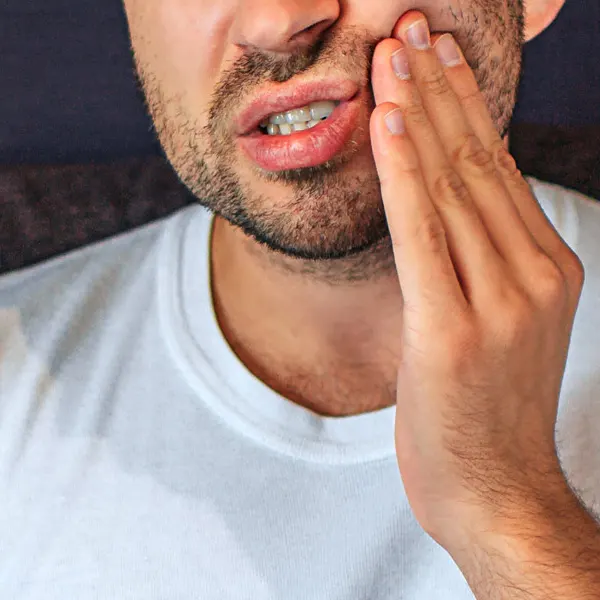

Teeth Grinding
Teeth Grinding (bruxism)
Teeth grinding, medically termed bruxism, is an often overlooked condition where individuals unconsciously grind or clench their teeth. This habit can happen during both wakefulness and sleep. While it happens during sleep, it then links to various sleep disorders like snoring and sleep apnea. Bruxism’s impact ranges from negligible in mild cases to causing severe dental health issues in extreme instances. Understanding this condition is very important for maintaining oral health and overall wellbeing.

Common symptoms of Teeth Grinding
How to tell if you have teeth grinding? The indicators are varied, as many people are not conscious of their grinding habits until they encounter dental problems. Common indicators include:
- Audible grinding or clenching of teeth during sleep, often brought to attention by a sleep partner.
- Teeth that appear flattened, fractured, or loose.
- Worn enamel exposes teeth to increased sensitivity and pain.
- Jaw discomfort, sometimes severe enough to cause a locked jaw
- Headaches originating in the temples,
- Cheek damage due to chewing,
- Disrupted sleep patterns.
Book an appointment at one of 6 MC Dental clinics.
We are open 7 days a week.
Call us on 03 8608 8968
or book online by clicking on the button below.
Causes of Teeth Grinding (Bruxism)
The causes of teeth grinding are complex and can be a combination of physical, psychological, and genetic factors. Awake bruxism may be a response to emotional states such as stress, anxiety, or intense concentration. Sleep bruxism, on the other hand, is often linked to nocturnal chewing movements. These factors interplay in the development of teeth grinding condition, with lifestyle and environmental aspects further influencing its occurrence.
Key risk factors of Teeth Grinding (Bruxism)
There are several factors that could elevate the risk of developing teeth grinding (bruxism). Stress and anxiety are primary contributors in today’s fast-paced world. Age plays a significant role, with bruxism more prevalent in children, often resolving by adulthood. Personality traits like aggressiveness or hyperactivity, certain medications, and lifestyle choices such as the use of tobacco, caffeine, or alcohol can increase the likelihood of bruxism. A family history of the condition and its association with other medical disorders also contribute to it.
Why a Dental Consultation for teeth grinding is Crucial
Before deciding on any treatment, it’s essential to speak with a dental professional who can provide tailored advice. MC Dental, with its six locations across Melbourne, offers expert consultations to assess and address your specific needs. Our dedicated team can guide you through various treatment options, which might include the use of mouthguards, but more importantly, we’ll provide personalized care suited to your condition.
Preventative Measures and Treatment Options for Teeth Grinding
Here are several treatment options available for teeth grinding, including:
Nightguards: Custom-made mouthguards that protect teeth from grinding during sleep.
Stress management techniques: Relaxation exercises, such as deep breathing or meditation, can help reduce stress and anxiety, which can contribute to bruxism.
Dietary changes: Avoiding caffeine, alcohol, and sugary foods can also be beneficial by helping reduce jaw clenching.
Dental appliances: Some appliances, such as occlusal splints, can be worn during the day to help keep teeth apart and prevent teeth clenching.
MC Dental’s Unique Approach to Treating Bruxism
At MC Dental, we pride ourselves on a patient-centred approach to treating teeth grinding. Our bilingual dentists, take the time to thoroughly understand each patient’s health history and lifestyle. This detailed understanding allows us to provide a tailored assessment and create a personalized ongoing management plan for your bruxism. Our commitment to excellence in dental care extends beyond treatment, focusing heavily on patient education and satisfaction, ensuring that every patient feels informed, comfortable, and cared for throughout their journey with us.
What to Do If You Suspect Teeth Grinding
If you’re experiencing any symptoms of teeth grinding that we mentioned earlier, or wish to learn more about preventative care, reach out to MC Dental for a consultation. Our experienced team will provide you with the personalized care and guidance you need to manage your bruxism and achieve a healthy and comfortable smile.
Common questions about Teeth Grinding (Bruxism)
Teeth grinding, also known as bruxism, is the involuntary clenching, grinding, or gnashing of teeth. It can occur during the day (awake bruxism) or at night (sleep bruxism). Causes can include stress, anxiety, abnormal bite, missing or crooked teeth, and sleep disorders.
Common symptoms include audible grinding sounds during sleep, flattened or fractured teeth, increased tooth sensitivity, jaw pain or stiffness, headaches, and disrupted sleep.
Yes, if left untreated, teeth grinding can lead to dental damage like tooth wear and fractures, jaw disorders, chronic headaches, and in some cases, can exacerbate temporomandibular joint (TMJ) issues.
Dentists diagnose bruxism through a combination of dental examination, discussing symptoms, and reviewing dental history. In some cases, additional tests or monitoring during sleep may be required.
Yes, custom-fitted mouthguards (or nightguards) are highly effective in preventing and mitigating tooth damage caused by teeth grinding. They act as a protective barrier between the upper and lower teeth, absorbing the forces of grinding and effectively preventing teeth wear, chipping, and cracking.
Beyond protecting the teeth, mouthguards also help ease jaw pain and discomfort associated with bruxism. By reducing the force of clenching, mouthguards prevent excessive pressure and strain on the jaw joints, minimizing pain, improving jaw function, and promoting overall oral comfort.
For optimal protection and comfort, custom-fitted mouthguards are essential. These are precisely moulded to your individual teeth, ensuring a snug fit that stays in place throughout the night, preventing any discomfort or interference with sleep.
Yes, children can experience teeth grinding, and the underlying causes are often like those in adults. Common factors include stress, misaligned teeth, pain-related reactions, teething, sleep disorders, or an underlying medical condition.
Treatment for teeth grinding in children typically involves addressing the underlying cause. Stress reduction techniques, such as relaxation exercises, mindfulness practices, and ensuring a comfortable sleep environment, can help alleviate stress-induced bruxism.
If misaligned teeth are contributing to bruxism, dental correction, such as orthodontics, may be recommended to improve the alignment and reduce grinding. In some cases, custom-fitted mouthguards may be prescribed for children to protect their teeth and jaw joints.
Regular dental checkups are crucial for monitoring bruxism in children and ensuring their overall oral health. Early detection and intervention can help prevent long-term damage to teeth and jaw function.
While there are measures you can take at home to manage teeth grinding, consulting a dentist is essential for a comprehensive evaluation, personalized treatment plan, and ongoing monitoring. Here are some home-based strategies that can help reduce bruxism:
Stress reduction: Implement stress management techniques in your daily routine, such as regular exercise, relaxation exercises like deep breathing or meditation, and ensuring adequate sleep.
Stimulant avoidance: Limit your intake of caffeine and alcohol, as these substances can exacerbate teeth clenching.
Good sleep hygiene: Establish a regular sleep schedule, create a relaxing bedtime routine, and avoid electronic devices before bed to promote restful sleep and reduce nighttime clenching.
Over-the-Counter: For temporary relief, over-the-counter solutions like basic mouthguards can be used, but they are not as effective or comfortable as custom-fitted ones provided by your dentists. Additionally, relaxation aids such as white noise machines or sleep aids may help improve sleep quality, reducing the likelihood of nighttime teeth grinding. However, these should be used in conjunction with, and not as a replacement for, professional dental advice.
Remember, while home-based management can be helpful, it is not a substitute for professional dental care. Regular dental checkups are crucial for monitoring teeth grinding, assessing the effectiveness of home-based strategies, and addressing any underlying dental issues that may contribute to bruxism.
Regular dental visits are essential for monitoring bruxism and ensuring your overall oral health. The frequency of visits will depend on the severity of your condition and the specific treatment plan prescribed by your dentist.
During these checkups, your dentist will assess your teeth for signs of wear and damage caused by grinding, evaluate the effectiveness of your current treatment plan, and adjust if necessary. Additionally, they will monitor your jaw function and overall oral health to ensure your bruxism is being effectively managed.
While there is no definitive cure for bruxism, its effects can be effectively managed and minimized through personalized treatment plans and lifestyle modifications. MC Dental’s approach focuses on addressing the underlying causes of bruxism in each patient, tailoring treatment strategies to individual needs and symptoms.
Treatment options may include custom-fitted mouthguards to protect teeth during sleep, stress management counselling to address emotional triggers, and lifestyle modifications such as avoiding stimulants and maintaining good sleep hygiene. In some cases, additional dental procedures, such as orthodontics or bite adjustment, may be recommended to address structural issues that contribute to bruxism.
Through comprehensive evaluation, personalized treatment, and ongoing monitoring, MC Dental can help you effectively manage bruxism, prevent further damage to your teeth and jaw joints, and promote overall oral health and well-being.
Book an appointment at one of 6 MC Dental clinics across Melbourne.
Open 7 days with over 35 bilingual dentists.
Call us on 03 8608 8968
or book online by clicking on the button below.



